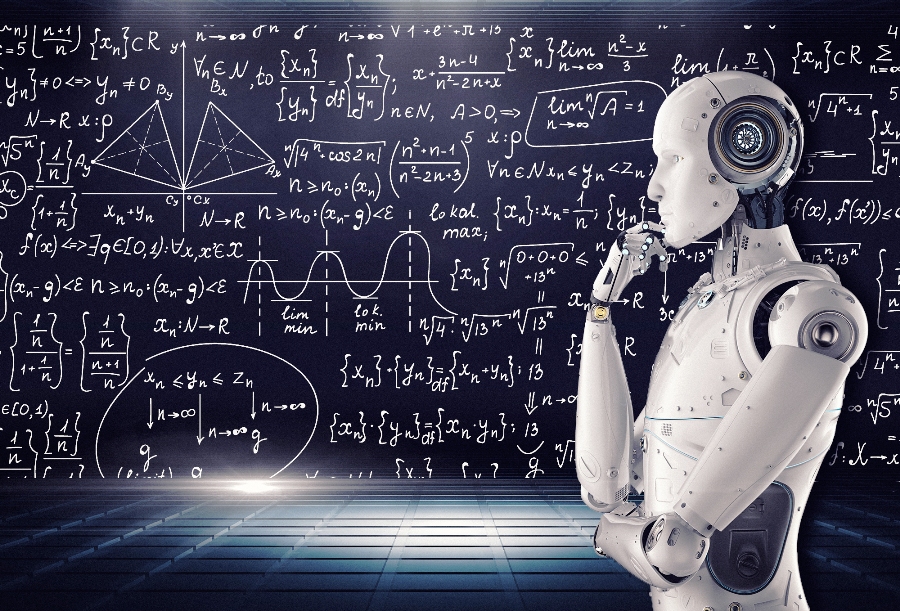by Azra Hussain
Machines have also begun tackling the human language by writing poems and news articles. Machine-written content has become so commonplace and so human-like that most people have likely read a few automated articles without even realising it.

Artificial intelligence (AI) has been one of the most popular genres in all of science fiction. The idea that a machine can be able to exhibit the same level of intelligence and cognition as a human being has captivated writers and audiences alike for ages. From ominous computer systems to superhuman androids, this captivating sub-genre of science fiction has experienced a wide range of depictions. However, fiction and television have a habit of romanticizing certain aspects, such as the frequent inclusion of robots. To scientists and programmers, building a robot in pursuit of artificial intelligence would be like constructing the skeleton of a train before the internal combustion engine was even invented.
In recent years, outspoken intellectuals like Stephen Hawking and Elon Musk have voiced their concern about the rise of artificial intelligence as brilliant minds across the globe are competing to retrace the millions of years of evolution that resulted in the human brain. While many experts have no doubts about machines’ ability to achieve human-level intelligence at some point in the future, just as many believe it to be an impossibility, because the human brain can turn out to be so incomprehensibly complex in such a way that we cannot replicate what nature has done to us. Then again, if random mutations can lead to intelligence, how hard can it be?
In fact, machines have already surpassed us in some limited domains. Take the two popular board games Chess and Go. The best human Chess and Go players in the world have already been defeated by artificial intelligence. No human player will ever again become the best at either of these two games. Fortunately, there is a lot more to the human condition than Chess and Go, but it is not that dubious to think that more general talents and abilities could be rendered equally obsolete. Assuming it’s possible, what happens when machines become more competent at performing any and all physical and mental labour is something that many scientists and philosophers have talked about.
If artificial intelligence becomes more competent in every regard then there will be little purpose or function left for us to serve. Machines have also begun tackling the human language by writing poems and news articles. Machine-written content has become so commonplace and so human-like that most people have likely read a few automated articles without even realising it. Many of us have most probably played around with text-to-speech engines. Text-to-speech engines function in a fairly simple way. All we have to do is to input some text, after which a voice will read it aloud. Up until now, this has been accomplished by having a voice actor read a long series of sentences and words and splicing the syllables into tiny samples before attempting to stitch and morph them back together. However, artificial intelligence can not only do this in seconds but can also produce more natural-sounding speech.
How Does It Work?
So how does it work? Simply stating that it is complicated is a severe understatement. However, with a suitable analogy, we can begin to understand the complexity that is artificial intelligence. Think of a human infant. Even though an infant does not really know or comprehend anything, the human brain has some work to do. For the most part, the young brain will be searching for patterns. It will systematically attempt to identify recurring events in an effort to make sense of the world. A few years of this repetitive learning process leads an infant to grow into a well-developed, fairly intelligent individual, who can think and make decisions for himself.
This is essentially how machine learning works as well. First, a simple mathematical model of the human brain is created and then it is fed a bunch of information. This artificial neural network will then attempt to make sense of the information given to it by learning from past mistakes and imitation. The result of this practice is natural evolution that no human could ever hope to manually programme or replicate. And there’s really no reason why this system could not be scaled up to human levels and beyond. A limiting factor of the human brain is that it has to fit inside a cranium. An artificial brain, however, could be the size of a building or even larger still. An artificial intelligence could also operate at the speed of light as well as improve upon itself. In essence, it could teach itself how to learn new things and in doing so would eliminate the need for a human at the controls.
Can It Control Itself?
There is, as one can imagine, a genuine cause for concern in this idealistic quest for improvement. The fact that artificial intelligence taking charge of itself is even theoretically possible fills people with dread and worry. If we render the species incompetent, there will not be any reason to prevent artificial intelligence from recognising that incompetence and taking control, and worse yet, eliminating humanity, because we cannot control something that is more intelligent than us. It would be like a colony of ants attempting to control even a single person. It just isn’t believable.
Once artificial intelligence realises this and takes control, it could not care less about our existence. And even if it did care, the thought of artificial intelligence trying to explain to us things that are beyond our intelligence is just not plausible. It would be similar to a human being attempting to explain to the millions of animals living in the jungle the geopolitical and socioeconomic reasons for why we continue to destroy their home. It is just not possible, because those creatures simply lack the intelligence to understand our points and thought-process, and that is what so many are concerned about. The thought that we would lack the intelligence to keep up is what prompts so many scientists and philosophers to protest and speak against the development of artificial intelligence.
If we assume that super intelligence is possible, it will not be long until that happens. It may be sooner than most of us think, as most estimation seems to land between three to six decades. These are, however, mere estimations, and can very well be wrong. Nevertheless, the arising situation leaves us with an inevitable and dreadful question: will artificial intelligence be humanity’s last invention?
(The author is an undergrad student. Ideas are personal)
On Internet by the same author
What is the Internet?
What Is Deep Web?
Virtual Crime: What Is Myth and What is Reality?
The Book
Virtual Class














